Addis Ababa, a city known for its rich culture and dynamic atmosphere, is often seen as the heart of Ethiopia. For anyone looking to call it home, grasping the nuances of living costs is vital. Whether you're an expat planning to relocate or a local aiming to budget wisely, understanding these factors can help avoid surprises.
Housing is typically the first major consideration. The city offers a range of options from modern apartments to traditional homes. Prices can vary significantly based on location and amenities, with bustling areas generally costing more. Next comes food, an essential factor shaped by both local flavors and global cuisines.
Transportation in Addis has its quirks, too. With a mix of public options and taxis, navigating the city's vibrant streets can be an adventure. Finally, the job market and salaries play a crucial role in balancing these expenses. Knowing the typical earnings in various sectors can provide a clearer picture of financial management in this city.
Housing and Rent
In Addis Ababa, finding the right place to live is a journey through neighborhoods filled with diverse character and charm. The city presents a spectrum of housing options, from plush apartments in places like Bole and Kazanchis to more modest dwellings further from the commercial heart. For many, proximity to work or school significantly influences this choice, shaping both budget and daily routines.
Rental prices in Addis Ababa vary broadly based on location, size, and condition of the property. Fancy apartments with modern amenities such as 24-hour security and swimming pools can cost significantly more than traditional homes. Yet, it's possible to find decent housing that aligns with a more modest income, particularly in less central areas. Prospective residents should also consider additional costs such as utilities and maintenance, which can compound the base rent.
"It's crucial to compare several options and not rush the decision. Speaking to locals or those familiar with the area can provide insights into both cost and community," advises a popular expat resource, Expat Arrivals.
The city's current housing market reflects both its growth and the challenges of urban living. Affordable living in Ethiopia's bustling capital is possible, yet it often requires a willingness to compromise on certain comforts. Each neighborhood has its rhythm and offerings, with some providing better access to amenities like shops and schools, while others boast peace and quiet.
Interestingly, the process of renting can differ from Western norms. While some landlords require formal agreements, many operate on a more informal basis, creating potential gray areas in tenant rights. It's advisable to clearly understand lease terms and negotiate conditions upfront to prevent misunderstandings later on. This blend of formal and informal is emblematic of a city that straddles traditional and modern worlds.
| Neighborhood | Average Rent for 2 BHK (per month) |
|---|---|
| Bole | $800 - $1500 |
| Piassa | $400 - $800 |
| Kazanchis | $600 - $1200 |
Finding a home is not just a financial decision but an opportunity to immerse in a community and a lifestyle. Addis Ababa living costs are deeply connected to the housing decision, making it important to prioritize what matters most to each individual or family. Whether seeking luxury or simplicity, the city offers a rich tapestry of choices.
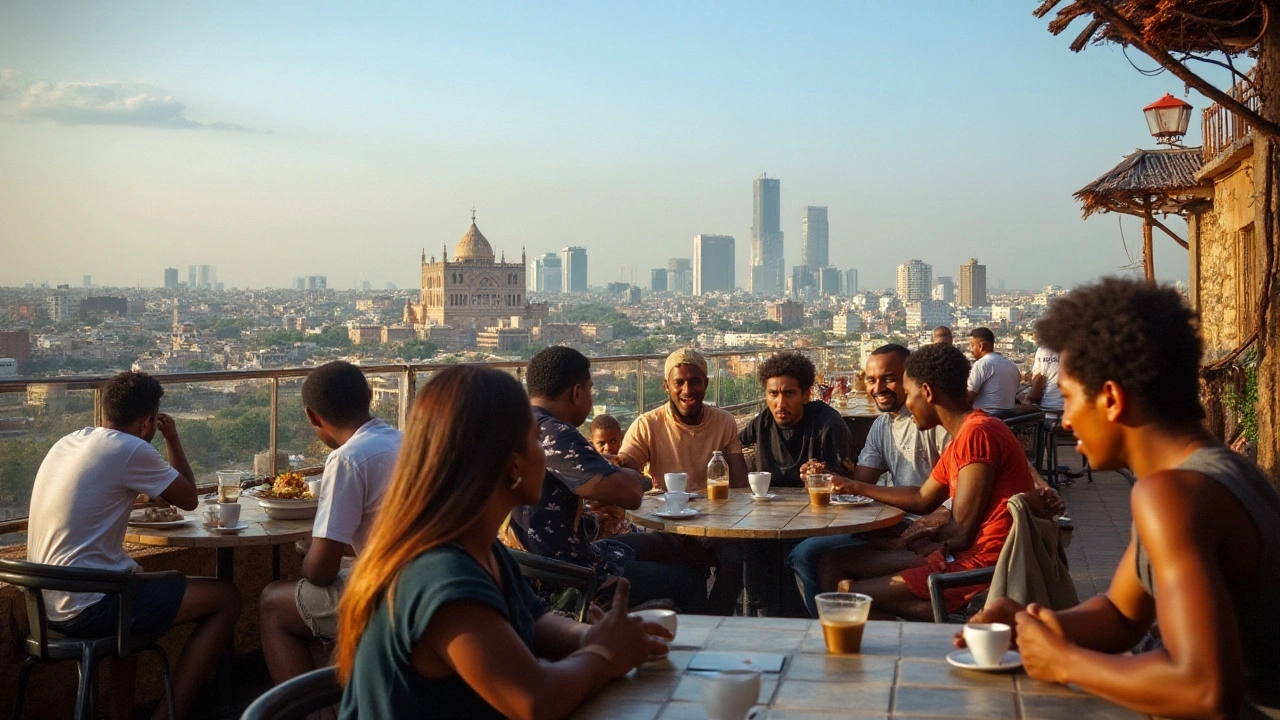
Food and Dining
Food in Addis Ababa is a journey into the heart of Ethiopia's culinary tradition, where every meal tells a story. The city is celebrated for its vibrant food scene that merges traditional Ethiopian flavors with modern twists. For many locals and tourists, trying 'injera,' a sourdough flatbread made from 'teff' flour, is an essential experience. This staple is typically served with a variety of stews, known as 'wats,' which include delights like spicy lentils, tender pieces of beef, and rich vegetable mixes.
Exploring the food and dining scene in Addis can lead you to bustling markets, where the aroma of freshly ground coffee often fills the air. It's a cultural tradition to enjoy an Ethiopian coffee ceremony, where every step from roasting to brewing is richly ceremonial. Many eateries in the city offer this experience, turning an ordinary cup of coffee into a memorable event. For the adventurous palate, Addis hosts a range of international cuisines as well, from Italian pastas and Indian curries to Chinese stir-fries, satisfying any culinary craving. Dining out is not just about the food; it's about the journey into Ethiopia's heritage.
For those mindful of their budget, the city provides both affordable and high-end dining experiences. Street food is hugely popular in Addis Ababa, with vendors selling everything from quick snacks like 'sambusa,' a spicy meat-filled pastry, to heartier dishes. Eating locally is often much cheaper than dining in western-style restaurants, making it possible to enjoy the flavors of Addis without breaking the bank. The dining scene is not only about satisfying hunger but also about engaging with the culture and meeting the people who make the city a welcoming place.
The dining culture in Addis also spotlights the social aspect of sharing food. Meals are often communal, encouraging lively conversations and a sense of community. This emphasis on shared experiences extends into the city's numerous dining spots, from humble cafes to upscale restaurants. Locals often say there's nothing like sharing a large plate of 'beyainatu,' a vegetarian platter that embodies a medley of tastes and textures.
The importance of coffee in Ethiopian culture cannot be overstated. A renowned Ethiopian proverb says, "Coffee is our bread," highlighting its integral role in daily life. Add to that the annual consumption rates which remain impressive with many households brewing their own coffee rather than buying pre-made versions. A fascinating aspect of enjoying coffee in Addis is how it still intertwines tradition with modern city living, allowing visitors a taste of authentic Ethiopian hospitality.

Transportation and Commuting
Living in a vibrant place like Addis Ababa means you'll need to master getting around the city. Transportation here is a blend of thrilling expedition and practical navigation, with options suited for various tastes and budgets. Most locals and visitors alike utilize minibuses, which are a cornerstone of the public transit system. They're affordable and cover a significant expanse of the city, pulsating through neighborhoods with determined frequency. However, understanding their routes can be complex at first, and it's common for new residents to seek advice from experienced travelers to decipher them.
Besides minibuses, Addis Ababa boasts a remarkable light rail transit system. Unveiled a few years ago, this addition has been a game-changer for many. The lines offer quick travel between major city areas, sidestepping the notorious traffic for which the city is known. Commuters appreciate the predictability and efficiency, especially during peak hours when congestion can baffle even seasoned drivers. On the subject of driving, having a car is seen as a luxury rather than a necessity. The reasons include not just the aforementioned traffic, but also the complexity of parking, the cost of fuel, and occasional road maintenance that results in detours or delays.
Addis Ababa expenses get a lift with the advent of ride-sharing apps, a nod to the modern era's tech-savvy commuter. These services are gaining popularity for their ease and reliable pricing. You can summon a ride with a few swipes on your phone, receiving upfront fare estimates without the haggling typically required with traditional taxi services. Though traditional taxis remain prevalent, providing a hustle-free option, they're best used when you're familiar with the going rates to avoid excessive fares. The breakdown of transport costs can provide a reasonable framework for budgeting in this cosmopolitan setting.
Now, statistics often offer a snapshot into a city's transportation efficiency. A report from the city's transit authority noted that the light rail system serves over 100,000 passengers daily. During a recent survey, one commuter shared her experience, saying,
"The light rail has transformed the way I traverse Addis Ababa. It's not just fast; it's a space where you see life happening around you."Such testimonies underline the valuable role public transport plays in the daily routines of residents.
For more adventurous navigators, bicycles have become a seen preference among some residents, fostering a new culture of eco-friendly travel. Yet, the cycling infrastructure is still catching up, with only some streets featuring bike lanes. Therefore, this choice is generally suitable for seasoned cyclists who are used to handling busy roads. No matter the method you choose, getting around Addis offers an immersion into its vibrant rhythm, filled with sights, sounds, and unexpected encounters.
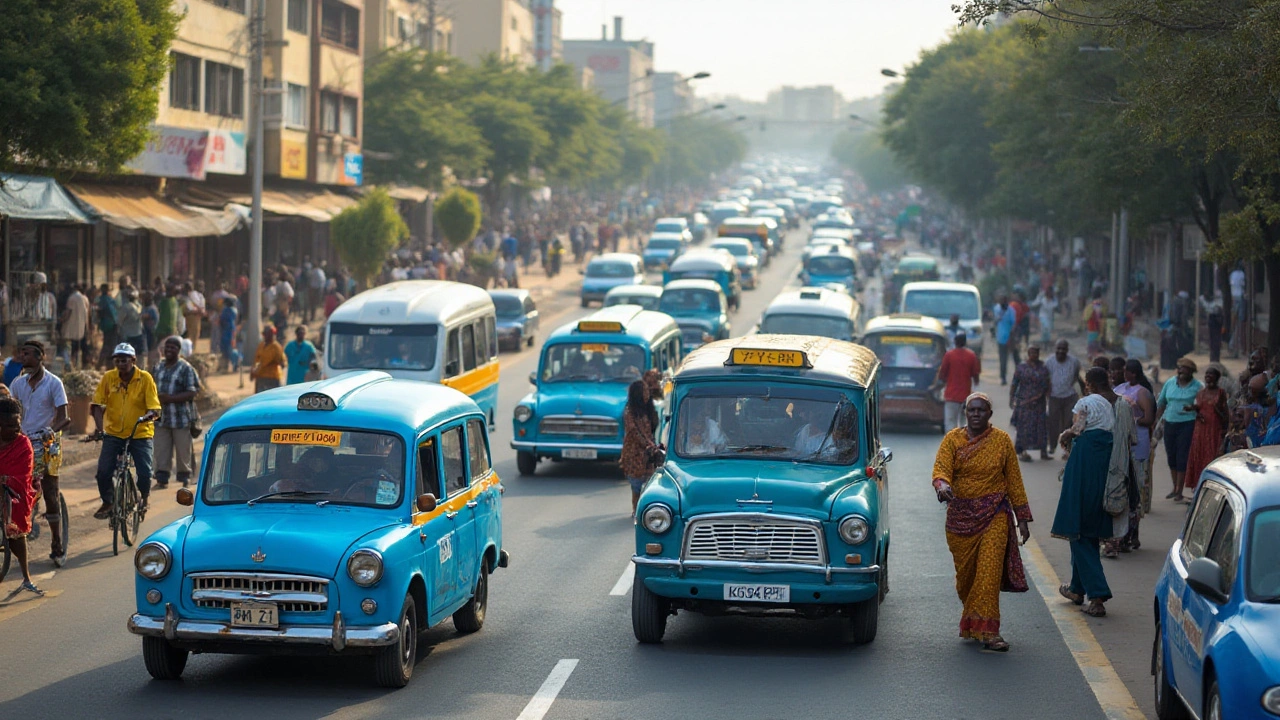
Salaries and Employment
In navigating the sprawling landscape of Addis Ababa living costs, salaries and employment opportunities emerge as pivotal factors. The capital city, being the economic hub of Ethiopia, boasts a diverse job market. From public sector roles to private enterprises, the range of employment options is quite vast. While salaries might not soar as high as those in Western countries, the cost of living, in some areas, corresponds with financial inflow, offering a sustainable life for many.
Specific industries in Addis Ababa thrive more visibly than others. The tech sector, for instance, is gaining momentum, with innovation hubs and startups sprouting, albeit gradually. The influx of foreign investors has notably enriched this domain. Meanwhile, traditional employment sectors such as agriculture and manufacturing continue to provide substantial job opportunities. Government jobs remain attractive due to their stability, though they may not always offer high salaries compared to burgeoning sectors. Educators, healthcare professionals, and hospitality staff also play crucial roles in the city's labor force.
An average salary in Addis Ababa varies depending on one's profession and experience level. For example, entry-level positions might offer modest pay, but as professionals gain experience, their income potential rises. Those in managerial roles or specialized fields often see higher earnings. Ethiopia's salary structure reflects a diverse range of incomes, closely knit with job responsibilities and industry dynamics.
"Despite the challenges, the Ethiopian workforce is overwhelmingly entrepreneurial, characterized by resilience and resourcefulness," notes an article in The African Business Review.
Addis Ababa expenses are intricately tied to income levels. Many residents aim to balance their budgets by aligning their living choices with their earnings. For instance, some choose to live in less expensive neighborhoods to save on living costs, allowing for more disposable income for leisure activities or savings. Rents and food costs, two significant aspects of living expenses, play pivotal roles in determining financial comfort.
The employment sector, with its challenges and potential, is critical for those considering living in Ethiopia's lively capital. Continuous growth and adaptation within the job market present opportunities for the future. Future trends, such as the digital transformation sweeping various sectors, promise changes and advancements. Prospective job seekers can thus find hope in the evolving economic landscape, knowing that possibilities are ever-emerging.
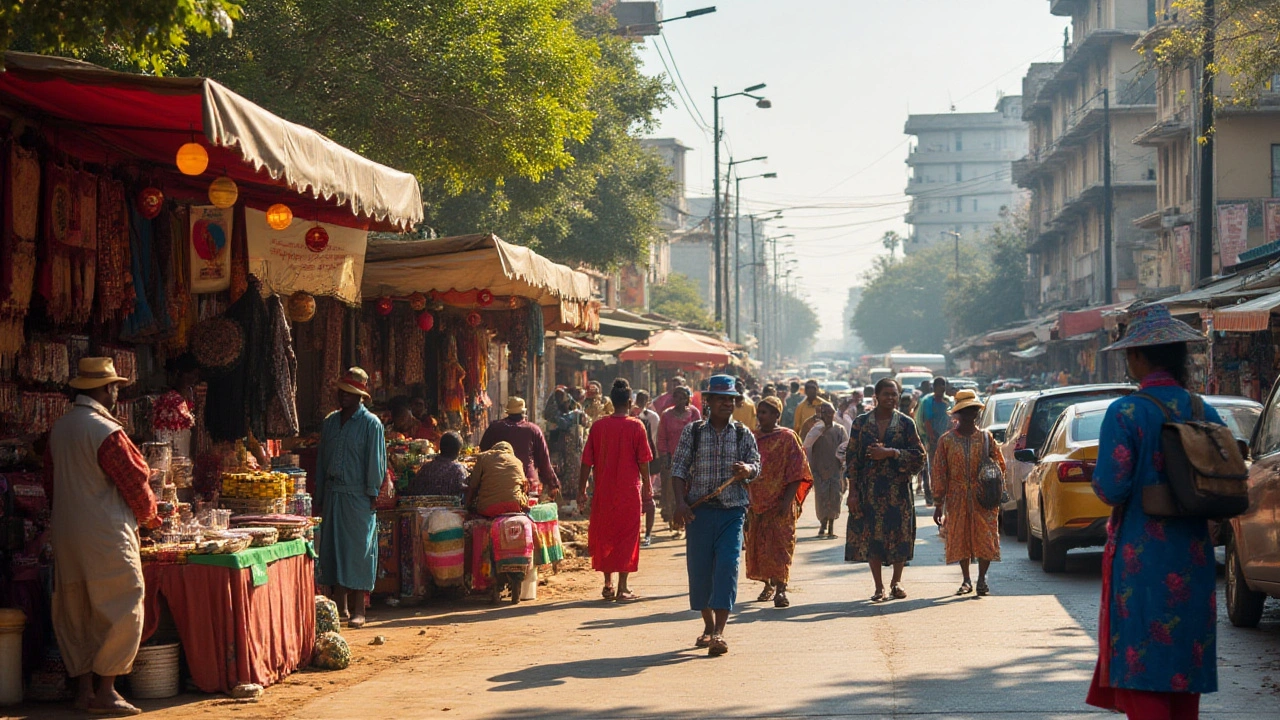
 Ethiopia's Challenges: Unveiling the Nation's Weaknesses
Ethiopia's Challenges: Unveiling the Nation's Weaknesses
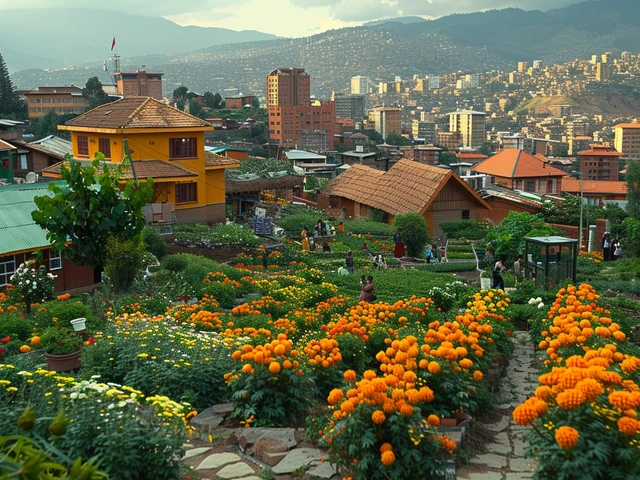 Best Business Opportunities in Ethiopia for 2024
Best Business Opportunities in Ethiopia for 2024
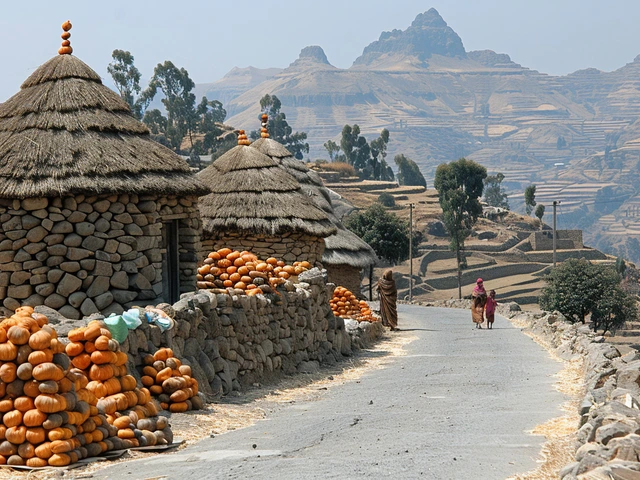 Understanding Poverty in Ethiopia: Facts and Insights
Understanding Poverty in Ethiopia: Facts and Insights
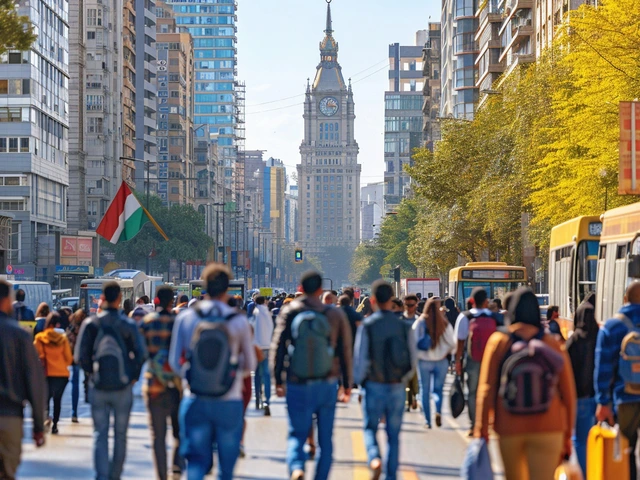 Understanding Taxation in Ethiopia: Do Ethiopians Pay Taxes?
Understanding Taxation in Ethiopia: Do Ethiopians Pay Taxes?
 The 7 Essential Occupations: A Deep Dive into Career Choices
The 7 Essential Occupations: A Deep Dive into Career Choices
christine mae cotejo
October 29, 2024 AT 16:40When you look at housing in Addis Ababa, the first thing that hits you is the sheer diversity of options, ranging from sleek high‑rise apartments in Bole to modest stone homes tucked away in quieter districts.
Rent for a two‑bedroom in a trendy neighbourhood can easily soar past $1,200, while a similar space a few kilometres out might sit comfortably around $500.
Utilities, which are often billed separately, can add another $50‑$100 to the monthly bill, and if you enjoy air‑conditioning during the hot season, expect a small premium.
Many expatriates opt for complexes that include security, a gym, and even a swimming pool, but these amenities come at a price that can push the total cost toward the upper end of the scale.
On the flip side, the city’s informal rental market allows you to negotiate directly with landlords, sometimes scoring a deal that includes water and electricity in the rent.
It’s worth noting that lease agreements in Ethiopia can be less rigid than in Western countries, so clarity on the terms is essential to avoid surprises.
Beyond housing, groceries present another variable: eating local staples like injera and lentil wats can keep your food budget under $150 per month, whereas dining at international restaurants will quickly double that figure.
Transportation can be a budget‑friendly aspect if you rely on the minibus system, where a single ride costs just a few birr, but the light rail offers a faster, slightly pricier alternative at about $0.75 per trip.
Ride‑hailing apps such as Ride or ZayRide have introduced a transparent pricing model, typically charging $3‑$5 for short trips across the city.
When it comes to salaries, the average monthly earnings in Addis hover around $600 for many professional roles, though senior positions in NGOs or multinational firms can comfortably exceed $1,500.
Tech startups are emerging, offering competitive packages that sometimes include housing allowances, which can offset the higher rent in central districts.
Public sector jobs, while stable, tend to provide modest compensation, often supplemented by benefits like health insurance and pension contributions.
For educators and healthcare workers, salaries are generally aligned with the cost‑of‑living index, meaning careful budgeting is crucial to maintain a comfortable lifestyle.
Overall, the key to affordability lies in balancing where you live with how you commute and where you source your meals; many residents find that a combination of a modest neighbourhood, public transport, and local markets yields the best financial equilibrium.
In short, Addis offers a spectrum of possibilities, and with strategic choices you can enjoy the city’s vibrant culture without breaking the bank.
Divyaa Patel
November 4, 2024 AT 06:00Imagine the city as a living tapestry, each thread representing a cost that weaves together the story of daily life; the drama unfolds with every coffee ceremony and each ride on the gleaming rail.
Larry Keaton
November 9, 2024 AT 19:20Yo, if you’re thinking about moving, just remember that the vibe in Addis changes block by block – Bole is lit, Piassa is chill, and you’ll feel the culture everywhere you go.
Liliana Carranza
November 15, 2024 AT 08:40Housing prices can surprise you.
Jeff Byrd
November 20, 2024 AT 22:00Sure, rent’s high, but hey, at least the traffic isn’t as bad as LA…
Joel Watson
November 26, 2024 AT 11:20One must acknowledge that the fiscal equilibrium in Addis rests upon a nuanced calibration of remuneration against expenditure, a balance seldom attained without meticulous planning.
Chirag P
December 2, 2024 AT 00:40Respectfully, the light‑rail fares are modest and worth the time saved during rush hour.
RUBEN INGA NUÑEZ
December 7, 2024 AT 14:00For newcomers, I recommend scouting out neighborhoods early and negotiating the lease terms before signing any agreement.
Michelle Warren
December 13, 2024 AT 03:20i think the food cost is cheap but the rent can be totaly expencive sometimes lol
Christopher Boles
December 18, 2024 AT 16:40Stay positive! Even with a modest salary, you can live comfortably by cooking at home and using public transport.
Crystal Novotny
December 24, 2024 AT 06:00Costs rise but life stays vibrant
Reagan Traphagen
December 29, 2024 AT 19:20Don't be fooled – the apparent affordability is a smokescreen; hidden fees and under‑the‑table payments keep you chained to the system.
mark sweeney
January 4, 2025 AT 08:40Honestly, the whole “affordable” hype is just a marketing gimmick, but if you really want to save money, live on the outskirts and rely on the minibus.
randy mcgrath
January 9, 2025 AT 22:00From a philosophical standpoint, the pursuit of a balanced budget mirrors the quest for personal equilibrium; both require reflection and adjustment.
Frankie Mobley
January 15, 2025 AT 11:20As someone who’s lived here, I can say the community is welcoming and the cost of groceries is lower than many other capitals.
ashli john
January 21, 2025 AT 00:40Make sure to check out the local markets for fresh produce they’re cheaper than supermarkets and you get to experience the culture first hand also don’t forget to barter a little it’s part of the fun
Larry Keaton
January 26, 2025 AT 14:00Adding to the earlier point, the light rail not only cuts commute time but also saves you a chunk of cash that would otherwise go to fuel and parking.
Frankie Mobley
February 1, 2025 AT 03:20Also worth noting, many expats find roommate arrangements a great way to split rent and share the experience of living in Addis.